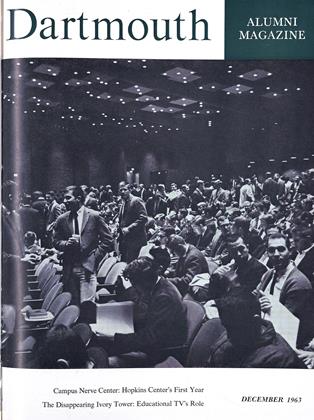By Lewis Meyer '34. Englewood Cliffs, N.J.: Prentice-Hall, Inc.252 pp. $4.50.
"'Don't know why,' Hazel Watts will tell you, leaning on the why with her Texas Drawl, 'but books about the book business just don't sell.'
"'Why not?' you ask.
"'Wish I knew. Everything about it from selling to publishing is fascinating to me. Maybe that's the answer. People in the business like it. People on the outside are afraid of it. Anyway, don't ever say on your dust jacket that your novel's about books unless you want to kill it deader'n a doornail.'"
Lew Meyer '34 hits the doornail on the head with this prediction, which comes some two-thirds of the way through his first novel, Second Wife. But he takes his own advice, for the blurb on the dust jacket, below the title, reads like the introduction to a TV soap opera: "She was his wife, yes, but not his first. How much of him was still possessed by Madge? Her book would uncover that secret?"
622 copies of this novel were sold at the autographing party held a few months back at the Lewis Meyer Book Store in Tulsa, Oklahoma.
Mr. Meyer is a talented and versatile alumnus. A Phi Beta Kappa at Dartmouth, he took his law degree at the University of Michigan and for some years has been a radio and TV book reviewer and critic in the Tulsa area, besides running his book store. His first book, Preposterous Papa, was published in 1959 by the World Publishing Company and subsequently reprinted as a Dell paperback. This was a reminiscent tale of the author's parents during the early Oklahoma territory days and was well received.
His venture into the novel field is less successful, although Meyer manages to blend rather skillfully books, sex, writing, publishing, and a few cliche observations "The trouble with Sunday is Monday morning" along with a certain amount of contrived suspense.
We have here a book within a book as the "Second Wife" attempts by writing a novel to explore her own reactions and her husband's to his first wife. In the novel, the Second Wife's book becomes a smashing success. Mr. Meyer's book is not likely to fare as well.
But there are several excellent characterizations, occasionally some perceptive insights and a few flashes of wit which offer hope that future efforts by novelist Meyer will be more rewarding.
In a prologue Meyer writes: "This one any good? I don't mean good and literary I mean good. Good reading. You know."
Each reader must find the answer to this himself.
 View Full Issue
View Full Issue
More From This Issue
-
 Feature
FeatureThe Disappearing Ivory Tower
December 1963 By SAMUEL B. GOULD -
 Feature
FeatureHORNING: Invention of the Devil
December 1963 By HAROLD BRAMAN '21 -
 Feature
FeatureCAMPUS NERVE CENTER
December 1963 -
 Article
ArticleTHE UNDERGRADUATE CHAIR
December 1963 By DAVE BOLDT '63 -
 Class Notes
Class Notes1931
December 1963 By WILLARD C. "SHEP" WOLFF, JOHN K. BENSON -
 Class Notes
Class Notes1930
December 1963 By WALLACE BLAKEY, HARRISON F. CONDON JR
CLIFF JORDAN '45
-
 Sports
SportsBig Green on TV
July 1953 By Cliff Jordan '45 -
 Article
ArticleTrack
April 1954 By CLIFF JORDAN '45 -
 Article
ArticleTrack
JANUARY 1959 By CLIFF JORDAN '45 -
 Article
ArticleFall Schedules
October 1959 By CLIFF JORDAN '45 -
 Article
ArticleFootball
July 1960 By CLIFF JORDAN '45 -
 Article
ArticleFreshman Winter Sports
January 1961 By CLIFF JORDAN '45
Books
-
 Books
BooksCOLLAGE: PERSONALITIES, CONCEPTS, TECHNIQUES.
OCTOBER 1962 By Barbara K. Foster -
 Books
BooksWHEN YOU BUILD YOUR CHURCH.
May 1955 By EDGAR H. HUNTER JR. '38 -
 Books
BooksA CHALLENGE TO MODERNISM
January, 1930 By Harold E.B. Speight -
 Books
BooksLABOR RELATIONS AND THE WAR
March 1943 By Henry L. Duncombe Jr. -
 Books
BooksSCENERY FOR THE THEATRE: THE ORGANIZATION, PROCESSES, MATERIALS AND TECHNIQUES USED TO SET THE STAGE.
MAY 1972 By JOHN FINCH -
 Books
BooksWEST POINT TODAY
May 1938 By R. A. Burns

